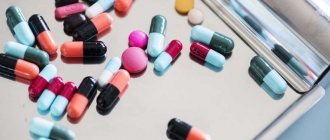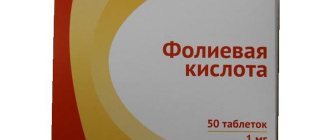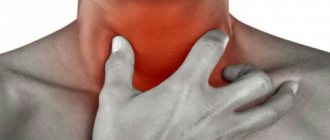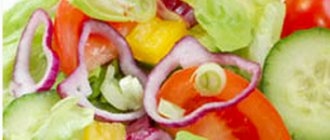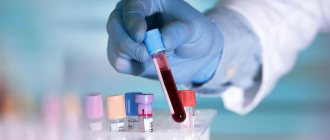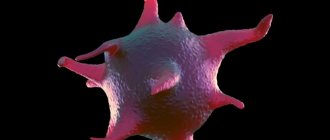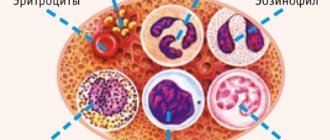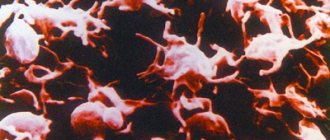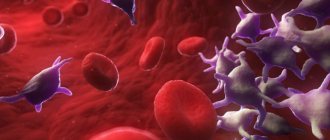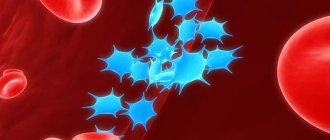Blood is the only tissue in the body with the ability to rapidly change structure at the cellular level. Therefore, a general blood test is a fundamental component of diagnostic measures in identifying pathologies.
Important! A sharp increase in the concentration of blood platelets is not always a sign of pathology. This condition is typical for older people and those who abuse alcoholic beverages. But thrombocytosis can cause the appearance of wandering blood clots, dangerous to health and human life. The question of how to reduce platelets in the blood is important for everyone.
What are the causes of increased blood cells in the body?
- inflammatory processes,
- pathological changes in the blood,
- infectious diseases of a viral, parasitic and fungal nature,
- functional disruptions in the gastrointestinal tract and liver,
- postoperative period after removal of the spleen,
- oncopathology and more.
Injuries and wounds that lead to blood loss can cause an increase in blood cells. Any operations, alcohol abuse, consumption of huge amounts of salt are preconditions for an increase in platelet levels in the blood.
Why is an elevated level dangerous?
It is the danger of blood clots that necessitates lowering platelet levels. In this case, it is important not only to adjust your diet, but also to consult a doctor for additional medical help.
Depending on the specific disease or factors contributing to elevated platelet levels, the doctor will prescribe appropriate medications and other treatments. He should also give recommendations on which foods should be added to the diet and which ones should be excluded.
In addition, when planning a diet, it is very important to take into account not only individual intolerance to certain food groups, but also other needs of the body.
It is necessary to plan the timing of meals and the distribution of proteins, fats and carbohydrates between meals.
It is also necessary to take into account the seasonality factor, ensuring protection from vegetables and fruits grown with the use of nitrates and other substances that have a negative, incompletely studied and dangerous effect on the human body.
Drug treatment
If the body has elevated levels of platelets in the blood, it is advisable to prescribe:
- Anticoagulants (Aspirin, Fraxiparin, Flagmina, Warfarin). Drugs in this group inhibit the activity of the blood coagulation system, which prevents thrombus formation.
- Antiplatelet agents (Pantoxifylline, Curantyl, Thrombo ACC, Clopidogrel, Ticlopidine), which slow down platelet aggregation, which reduces the risk of blood clots.
- Immunostimulants (Interferon) to maintain the body's defenses.
Self-treatment of thrombocytosis is not allowed. Inappropriate therapy can lead to serious consequences, including internal hemorrhage
You can also reduce platelets in the blood using the following medications:
- Anagrelide is a specific drug that helps reduce the level of blood platelets in the blood, which prevents the formation of blood clots;
- Trental, Pentoxifylline, which reduce blood viscosity and reduce the adhesion of platelets to each other. In addition, the drugs improve blood microcirculation and cellular respiration;
- Hydroxyurea is a drug that is prescribed for pathologies, including malignant ones, of the bone marrow, which indirectly affects the level of platelets;
- Xanthinol nicotinate is a vasodilator that improves blood circulation and normalizes redox processes.
The dosage of each drug is determined by a specialist in accordance with the instructions for its use.
Caution should be exercised when using certain diuretics, contraceptives and hormonal drugs that increase blood viscosity.
What should you avoid?
At the same time, you will have to give up some groups of foods that raise platelets. These primarily include those that contain abundant amounts of iron and other specific substances that promote blood thickening. It is recommended to exclude or limit consumption for the following products:
- liver (cod, chicken, pork, beef, turkey, etc.);
- Greek;
- milk and dairy products;
- berries (gooseberries, black currants, mulberries);
- some exotic fruits (mango, papaya, rambuttan, pitahaya);
- other foods high in iron.
In addition to a properly selected diet, a healthy, balanced diet is impossible without consuming enough clean drinking water. Consumption recommendations vary from 1 to 2 liters daily depending on the individual characteristics of the body.
In addition, it is important to change your lifestyle in general:
- giving up bad habits (smoking, excessive alcohol consumption, overeating);
- the presence of moderate physical and mental activity and constant development;
- preference for living in areas with favorable environmental conditions;
- giving up stress.
How to reduce platelets in the blood thanks to a diet menu?
To reduce the concentration of platelets in the blood, it is important to avoid drinking alcoholic beverages and smoking. After all, they have an unfavorable effect on the organs of the human body. It is advised to avoid foods rich in carbohydrates. After all, they promote the formation of uric acid, which is associated with the concentration of platelets in the plasma.
Dietary nutrition for elevated platelets requires the use of special foods. They will help the blood normalize viscosity and avoid blood clots.
Products that lower blood platelets:
- Walnut,
- seaweed,
- seafood,
- feijoa.
Basics of therapy
The normal platelet count depends on the patient’s age, gender and the presence of chronic pathologies. If the level of these blood cells reaches 400-500 µm/l. In women, the maximum value is lower; already at a value above 370 µm/l, it is necessary to begin therapy to lower it. It is based on medications:
- Aspirin is a well-known and inexpensive remedy that, when taken regularly, can quickly reduce blood viscosity. It should not be taken to treat infants, as it causes allergic reactions. It is also contraindicated during pregnancy, for therapy in women prone to menstrual bleeding, people with diseases of the gastrointestinal tract (erosion, colitis, ulcers or peritonitis).
- Thrombo ACC is a non-steroidal anti-inflammatory drug. It belongs to a new generation of medications; the use of this drug is effective, since it has several principles of action: it prevents platelet aggregation, reduces the amount of released prostaglandins, and blocks the production of thromboxane. It is most often used for thrombocytosis. Treatment with this drug is prohibited for bleeding disorders, chronic diseases of the liver, spleen, pancreas or kidneys.
- The complex drug Trental facilitates the passage of blood through the vessels. It belongs to the protective agents for the myocardium. It is prohibited to use this remedy during the rehabilitation period after surgery, heart attack or stroke. Doctors do not prescribe it for heavy bleeding.
- Warfarin suppresses the synthesis of anticoagulants. It cannot be used after operations, in patients with disorders of the musculoskeletal system and chronic disorders of the hematopoietic system.
- Clopidogrel affects the binding of platelets to each other, allowing nuclear-free particles to be eliminated from the body by the liver and spleen. Its only contraindication is hypersensitivity to the components of the drug.
Do not neglect drug treatment, since an increase in platelet levels negatively affects the human heart and vascular system. It can cause death. However, you should not prescribe blood thinning medications on your own. If taken carelessly, they can lead to internal bleeding.
Excess after chemotherapy actions
After chemotherapy, there is usually a slow increase in platelet levels. This treatment method aggressively affects not only cancerous cells, but also formed blood cells.
To prevent the development of thrombocytopenia, in this case the following treatment is necessary:
- 10-day course of recombinant thrombopoietin;
- taking medications that stimulate the formation of new platelets;
- blood transfusion;
- consumption of folic acid;
- immunoglobulins;
- a special diet in which spicy foods and alcoholic drinks are removed from the diet; most of the diet should consist of foods with a high content of vitamin A.
When creating a menu, it is recommended to consult with your doctor.
A low platelet count may indicate various pathological conditions, which, if left untreated, increase the risk of developing more serious complications, often resulting in death.
Common and life-threatening consequences of a lack of platelets in the blood include:
- development of internal bleeding;
- severe blood loss when receiving even minor cuts;
- acute cerebral hemorrhage;
- damage to the retina as a result of increased blood pressure.
If you suspect a low platelet count, you should immediately contact a specialist. Once the diagnosis is confirmed, treatment begins immediately.
Ways to lower platelets
Many patients with thrombocytopenia ask the question: “Is there a factor that lowers these blood cells?”
Perhaps the answer is yes, but each person should have their own approach. Both low and high platelet levels are abnormal. In this case, internal organs suffer: the abdominal cavity, joints, and liver. If you do not pay attention to this problem, then after 3-4 years blood clots may form. Pharmacists offer many medications against thrombocytopenia. They are able to regulate the number of elevated blood cells. Aspirin is considered the most popular. But don’t delude yourself, because its popularity is deserved by its price, not its quality. Of course, after taking aspirin, the platelet count decreases, but many side effects follow. There is only one conclusion - a more expensive drug is needed, but only a doctor can prescribe it after a full examination.
Traditional medicine recipes against thrombocytopenia
The following recipes will help:
- A decoction made from nettle leaves will help cope with the disease - lower platelets. It’s better if you prepare the leaves yourself in the summer. Dry them in the country and seal them in bags or jars.
- Crushed dried leaves (1 tablespoon) are poured with boiling water (200 ml) and kept on low heat for another ten minutes. The healing drink is infused until it cools. Drink 1/3 cup before meals.
- Another effective remedy is verbena. Pour a glass of boiling water over the dried leaves. Leave for one hour. Gradually drink this glass of broth throughout the day. With the dawn of a new day, prepare a fresh drink.
- Consuming sesame oil will help regulate platelet counts. Drink 15 ml after meals.
- A decoction of yarrow is prepared similarly to the previous tinctures. Just drink one tablespoon three times a day, regardless of food intake.
- Strawberries and rose hips are brewed for 15 minutes and drunk before meals.
- Fresh beets can improve the state of platelets. Many people do not like to eat this root vegetable raw, but there is one cooking method that even children should like. Grate the beets and add a little sugar. It is necessary to start with small portions, gradually increasing if no side effects are observed. You can prepare beetroot juice and drink it on an empty stomach.
It is better to remove seasonings and spices from the diet, since they only have a negative effect on the body.
But about folic acid there is a completely different opinion. It is necessary for increased platelet volume. This component will help replenish yolks, hard cheese, liver, green vegetables and fruits, apricots, and pumpkin.
Diet
Dietary ways to increase white blood cells in the blood if they have fallen include proper balanced nutrition and consumption of foods that promote production. The menu must include products with vitamin C, E, potassium, Omega-3, and zinc. Recommendation: After chemotherapy you need to consume protein, otherwise it is more difficult for the body to cope.
Products that increase the level:
- Drink liquid. The recommended intake for an adult is two liters of clean water per day. It is imperative to boil it before use.
- Berries and fruits containing vitamin C.
- Fiber found in vegetables.
- Dietary white meat.
- Eggs.
- Fish, seafood.
- Vegetable fats: nuts.
- Cereals, cereals, legumes.
Tips: vitamin A. The main useful vitamin needed by a convalescent person, its essence is to increase white blood cells. It is found in orange fruits, vegetables, and salmon. Vitamin C to support immunity is found in citrus fruits.
Prohibited foods include: fatty foods, smoked, spicy, canned. Eliminating these foods from the body will facilitate the healing process.
The danger with low levels of immunity consists of insufficiently washed fruits and vegetables that contain parasite eggs, infection, and bacteria. Undercooked meat is also dangerous. Due to reduced resistance, these products will lead to additional diseases and complications
Therefore, it is important to follow preventive measures, thoroughly wash products, and heat-treat them. Maintain hand hygiene
Enhancement Methods
To monitor your platelet levels, you need to have a blood test done at least once a year. To determine the exact number of platelet platelets, blood is drawn from a patient's finger or vein. The method can be chosen by the person himself, based on the capabilities of the laboratory.
To obtain the most reliable information, it is recommended to adhere to some rules:
- It is better to donate biomaterial in the morning on an empty stomach;
- Avoid excessive overeating the day before the procedure;
- exclude physical activity.
To increase the platelet count, the doctor, if necessary, prescribes medications. If there is a slight decrease in the indicator, then a vitamin-mineral complex or special dietary nutrition will be sufficient.
Traditional treatment, which involves taking certain groups of medications, is used in case of critical deviation from the norm. Among the most common and frequently used means by which platelets can be raised are the following:
- Etamzilat. Available in the form of a solution intended for intravenous administration. The drug has a stimulating effect, which helps to increase the production of platelet cells by the bone marrow. The effectiveness will be noticeable 5-15 minutes after the solution is administered.
- Prednisolone is a steroid hormone that is sold in tablet form. An increase in platelets is observed within seven days.
- Immunoglobulin. The composition includes substances that help stimulate the immune system. After completing the course of treatment, the level of the cells in question increases to 75 percent compared to the initial levels.
- Vikasol. Prescribed to prevent the development of internal bleeding.
- Sodecor is a herbal preparation that normalizes the process of hematopoiesis.
All medications should be taken only as prescribed by a doctor. You should not self-medicate with medications, since the result of incorrect actions can provoke dangerous complications.
To quickly increase platelets in the blood, you can use folk remedies.
For treatment at home, the following drugs will be most effective:
- Nettle decoction. It is considered one of the best for stopping bleeding. In addition, the plant helps cleanse the blood and normalize its composition. To get the most positive result, you need to drink 200 milliliters of decoction daily.
- Lemon and honey. Good for strengthening blood vessels. For administration, the components are mixed in equal proportions. To enhance the healing effect, it is recommended to add flaxseed or sesame oil to the composition.
- Oak bark. To prepare a medicinal infusion, you need to pour a tablespoon of raw material with 200 milliliters of boiled water and let it brew. The decoction is used as a rinse, which is effective for bleeding gums, which also indicates a decrease in platelet cells in the blood.
- Pomegranate juice. For effective treatment, it is recommended to use only natural products. Before use, it is usually diluted with water in a 2:1 ratio. If you have stomach problems, it is better not to drink juice on an empty stomach.
- Chokeberry. Helps increase blood viscosity. To increase platelet levels, you need to eat about 50 berries per day for 20 days.
Despite the effectiveness of natural ingredients, treatment with traditional medicine should only be carried out with the permission of the attending physician. It is important to take into account contraindications, the general condition of the body, concomitant pathologies, etc.
Special food
A properly formulated diet also plays an equally important role in increasing the number of these cells. It must include foods rich in iron:
- pumpkin seeds;
- soy;
- spinach;
- carrot;
- buckwheat;
- liver;
- Brewer's yeast;
- strawberry;
- potato;
- beet;
- bananas and other foods that increase the number of platelet cells.
For the purpose of treatment and prevention of low indicators, the following must be excluded from use:
- ginger;
- citrus;
- blueberries and raspberries
- alcohol;
- olive oil;
- chocolate products.
The menu is designed so that it includes a maximum of healthy products, which contain all the important vitamins and microelements. There should be no dishes that thin the blood.
During pregnancy, women will in any case experience changes in their platelet count. If the indicator rapidly decreases, therapeutic measures must be carried out immediately, since the pathology is dangerous to the health of not only the mother, but also her unborn baby.
Treatment measures will include:
- taking glucocorticosteroid drugs (for example, Prednisolone);
- administration of immunoglobulin not only during pregnancy, but also during labor and after it;
- carrying out blood transfusion (in case of a serious pathological condition).
In cases where conservative treatment does not bring positive results, a decision is made to remove the spleen.
